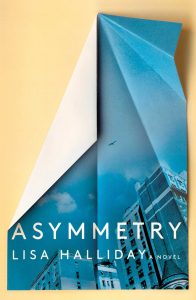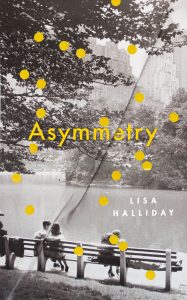 Published by Granta UK/ Simon & Schuster US
Published by Granta UK/ Simon & Schuster US
February/March 2018
Reviewed by Elsbeth Lindner
A novel that devotes its third and final section to a transcript of a Desert Island Discs episode showcasing one of its lead character, including all eight musical selections, choice of book and luxury (in this case an inflatable doll) seems likely, at the very least, to garner favour among a section of the British listening public.
But Halliday’s debut will likely resonate rather more widely than BBC Radio 4 listeners. This well written, often funny, but also tender and subtle first work demonstrates significant talent and has been acquired by publishers in some seven countries.
The book’s structure is both unusual and asymmetrical. Its first section, ‘Folly’, sketches the arc of a relationship between an elderly American writer, Ezra Blazer, and a mid-twenties publishing  assistant, Mary-Alice, who meet each other on a bench in Central Park, New York. Their involvement – a kind of sentimental education for her, a September love affair for him – is delightful and touching, but serious too. Alice is in search of purpose and aspires to write herself. Ezra, a multiple award-winner (though not, elusively, of the Nobel Prize) is neither well nor strong, yet is writing tirelessly, while observing daily, ‘I don’t know if it’s any good.’ The differences between the pair, of age, experience and attitude, are bridged first by their attraction and his quirky gifts, later by music, sport and a peculiar reliance.
assistant, Mary-Alice, who meet each other on a bench in Central Park, New York. Their involvement – a kind of sentimental education for her, a September love affair for him – is delightful and touching, but serious too. Alice is in search of purpose and aspires to write herself. Ezra, a multiple award-winner (though not, elusively, of the Nobel Prize) is neither well nor strong, yet is writing tirelessly, while observing daily, ‘I don’t know if it’s any good.’ The differences between the pair, of age, experience and attitude, are bridged first by their attraction and his quirky gifts, later by music, sport and a peculiar reliance.
Set against this is an entirely separate-seeming novella entitled ‘Madness’, featuring Amar, an Iraqi-American economist. Part biography, part insight into the political ramifications of the Iraq war, which is the time frame for the Alice/Ezra story, its structure spreads out from Amar’s experience in transit to Kurdistan via Heathrow airport. This tale of politics, family, opportunity and mortality also offers hints at how it may connect to ‘Folly’, although those links are made clearer in that last section focused on Ezra’s radio appearance.
There’s a wide span of material here, geographically, culturally, in terms of age and gender too. But Halliday – who won the 2017 Whiting Award for Fiction – writes in a fresh, unobtrusive manner and seems easily capable of the stretch. Each of her three leading characters emerges with a credible, compelling perspective but most beguiling of her creations, inevitably, is droll, worldly-wise Ezra, reminiscent of Roth and Bellow amongst others, blessed with a tireless fund of jokes and cultural references. His accrued history of creativity, relationships, reading and discovery suggests the ballast that is coming to ground Alice and Amar too.
Peripheral characters are few in this novel. What predominates are context and choice, and the filaments of connection between character and artifice, between living, thinking and writing. This is a strikingly mature and entertaining first work. Lisa Halliday’s first excursion is one to note.
